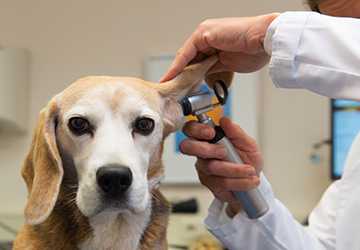When Should You Take Your Pet to the Vet
Caring for a pet brings immeasurable joy and companionship to our lives. We must keep an eye on their health and comfort. This guide delves into understanding when to take your pet to the vet, spotting signs your pet needs a vet, and scheduling pet health checkup timing to ensure they lead a healthy life.

Critical Alerts: When Speed is of the essence.
Our pets' actions and physical cues are windows into their well-being. It's imperative to seek veterinary care posthaste if you notice:
● Atypical lethargy: An unusual drop in energy levels can be a harbinger of health issues.
● Respiratory distress: Any anomaly in breathing patterns demands immediate attention.
● Persistent digestive upset: Recurring episodes of upset stomach are cause for concern.
● Drastic weight shifts: Unexpected weight changes are indicators of potential health problems.
● Alterations in consumption habits: A decreased appetite or a surge in thirst can signal underlying issues.
Proactive Measures: The Merits of Consistent Veterinary Visits
Anticipating health issues through consistent veterinary visits is a proactive step towards ensuring pet health. Such visits typically encompass:
● Immunization refreshers: A bulwark against infectious diseases.
● Intruder deterrence: A strategy to fend off parasites.
● Oral health evaluations: A preventive measure against dental diseases.
● Nutritional counsel: Personalized advice to bolster health through diet.
Optimal Veterinary Checkup Frequency
● Juvenile pets: They benefit from more frequent evaluations during their formative months.
● Mature pets: Annual assessments are generally sufficient.
● Aged pets: For senior pets, visiting the vet twice a year helps detect health issues early.
Intervening Visits: Recognizing the Need for Additional Care
Despite regular checkups, certain conditions necessitate unscheduled visits:
● Mobility issues: Difficulties in movement could suggest various health concerns.
● Unusual grooming patterns: This may point to discomfort or allergies.
● Oral health changes: Signs of dental distress should not be overlooked.
● Behavioural shifts: Uncharacteristic behaviours may indicate pain or other health issues.
Enhancing Veterinary Visits: The Importance of Preparation
Making veterinary visits fruitful requires some preparation:
● Symptom journaling: Recording observations can provide invaluable insights to your vet.
● Question compilation: Having a list of concerns ensures comprehensive care.
● Health history updates: Informing your vet about past health issues or treatments is crucial.
Subtle Indicators Not to Ignore
Amid the hustle and bustle of daily life, specific minor changes in our pets' behaviours or habits might not immediately raise alarms but are nonetheless pivotal:
● Subtle changes in sleep patterns can reflect discomfort or anxiety, hinting that a checkup might be needed to assess any underlying issues.
● Mild alterations in interaction, such as decreased sociability or changes in how pets engage with family members, can signal health or emotional challenges that might require professional advice.
● Variation in eye clarity or brightness: The saying that the eyes are the window to the soul also holds true for pets. Changes in the appearance of your pet's eyes can be early indicators of health issues.

Integrating Technology in Pet Health Management
The digital revolution has paved the way for sophisticated tools and applications specifically designed for pet health:
● Wearable Tech for Pets: Modern devices can now monitor pets' activity levels, sleep patterns, and vital signs. This technology enables pet owners to catch potential health issues before they become serious.
● Telehealth Services for Pets: The convenience of virtual consultations has made veterinary advice more accessible. For non-urgent issues, telehealth services can be a timely and efficient resource.
Nutritional Innovations: Customizing Diets
The field of pet nutrition is evolving, offering diets that cater to the unique needs of each pet:
● Customized Meal Plans: Tailored meals can address specific health concerns and optimize a pet's nutrition.
● Gut Health: Introducing probiotics and prebiotics supports digestive well-being, a cornerstone of overall health.
● Superfoods for Pets: Including nutrient-rich ingredients in a pet's diet can enhance immune function and vitality.
The Annual Health Odyssey: Beyond the Basics
An annual vet visit stands as a fundamental pillar of pet health management. However, these checkups offer much more than the basic health assessments:
● Behavioural assessment: Examining any changes in your pet's behaviour can reveal early signs of stress or health issues, guiding necessary interventions.
● Environmental review: Discussing your pet's living conditions can lead to personalized recommendations for preventing health problems and ensuring your pet's environment supports its well-being.
● Advanced screenings: Early genetic screening or diagnostics can be a proactive step toward longevity and health, particularly for breeds with known predispositions to certain conditions.
Community and Support: Building Networks
A supportive community can have a profound impact on pet care, offering resources and emotional support:
● Pet Owner Groups and Forums: These platforms allow pet owners to exchange advice and experiences, providing a wealth of collective knowledge.
● Pet Bereavement Support: Access to specialized counselling and groups helps owners cope with the loss of a pet, addressing an often-overlooked aspect of pet care.
The Art of Timing: Lifecycle-Specific Vet Visits
Understanding the importance of pet health checkup timing involves recognizing the different healthcare needs at various life stages:
● The formative phase: Young pets benefit from establishing a health baseline early in life.
● The prime years demand diligent monitoring to ensure ongoing health and vitality.
● The golden years: As pets age, more frequent screenings become essential to promptly catch and address age-related conditions.
Empowering Pet Owners: The Role of Education
Arming pet owners with knowledge and resources plays a crucial role in fostering pet health:
● First aid knowledge enables pet owners to respond effectively to emergencies, bridging the gap until professional care is available.
● Nutritional literacy profoundly impacts pets' health, with a balanced diet vital to preventing many health issues.
● Awareness of breed-specific issues prepares pet owners to anticipate and manage potential breed-related health risks.
Conclusion
Being proactive about when to take your pet to the vet, recognizing signs your pet needs a vet, and adhering to pet health checkup timing are fundamental to pet care. Always stay observant of your pet's behaviour and physical condition and seek your vet's advice when unsure. Timely intervention can make a significant difference in your pet's health.







